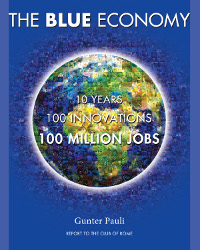
by GUNTER PAULI author of the Report to the Club of Rome
Blue Economy is ZERI’s philosophy in action.
Blue Economy is where the best for health and the environment is cheapest and the necessities for life are free thanks to a local system of production and consumption that works with what you have.
“Innovative business models“ are capable of bringing competitive products and services to the market responding to basic needs while building social capital and enhance mindful living in harmony with nature's evolutionary path.
“Competitiveness”is harnessing and optimizing the innate virtues and values connecting untapped local potential – like a natural system, where the seeds lie fallow only to sprout with amazing vigor at the first rain unleashing joy and happiness as the conditions for mind full-living are met in balance and in harmony.
• Solutions are first and foremost based on physics. Deciding factors are Pressure and Temperature as found on site.
• Substitute something with Nothing – question any resource regarding its necessity for production.
• Natural systems cascade nutrients, matter and energy – waste does not exist. Any by-product is the source for a new product.
• Nature evolved from few species to a rich biodiversity. Wealth means diversity. Industrial standardization is the contrary.
• Nature provides room for entrepreneurs who do more with less. Nature is contrary to monopolization.
• Gravity is main source of energy, solar energy is the second renewable fuel.
• Water is the primary solvent (no complex, chemical, toxic catalysts).
• In nature the constant is change. Innovations take place in every moment.
• Nature only works with what is locally available. Sustainable business evolves with respect not only for local resources, but also for culture and tradition.
• Nature responds to basic needs and then evolves from sufficiency to abundance. The present economic model relies on scarcity as a basis for production and consumption.
• Natural systems are non-linear.
• In Nature everything is biodegradable – it is just a matter of time.
• In natural systems everything is connected and evolving towards symbiosis.
• In Nature water, air, and soil are the commons, free and abundant.
• In Nature one process generates multiple benefits.
• Natural systems share risks. Any risk is a motivator for innovations.
• Nature is efficient. So sustainable business maximizes use of available material and energy, which reduces the unit price for the consumer.
• Nature searches for the optimum for all involucrated elements.
• In Nature negatives are converted into positives. Problems are opportunities.
• Nature searches for economies of scope. One natural innovation carries various benefits for all.
• Respond to basic needs with what you have, introducing innovations inspired by nature, generating multiple benefits, including jobs and social capital, offering more with less: This is the Blue Economy
See Also:



